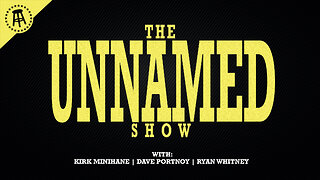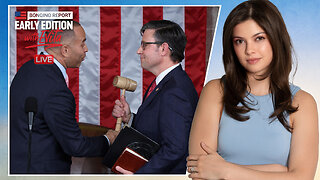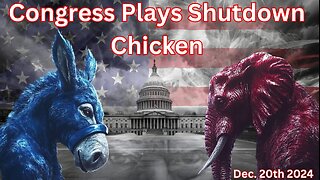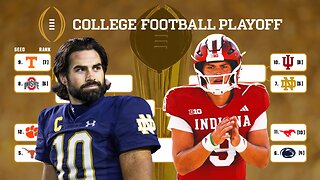Premium Only Content

Green Eyed Lady Don't Call Us We'll Call You Rollin Hills Sugarloaf
Green Eyed Lady Album: Sugarloaf (1970)
Don't Call Us We'll Call You Album: Don't Call Us, We'll Call You (1975)
Rollin Hills Album: Spaceship Earth (1979)
by Sugarloaf
Who is the green-eyed lady? According to lead singer Jerry Corbetta, it was his girlfriend at the time, Kathy, who is bandmates referred to as the green-eyed lady. He wrote the song with producer J.C. Phillips and a songwriter named David Riordan.
Since "Green-Eyed Lady" gets almost daily play on US radio stations to this day and none of their other songs do, many will be surprised to know that Sugarloaf is not a one-hit wonder; their other hit is "Don't Call Us, We'll Call You" from 1975 at #9 on the Billboard Hot 100. "Green-Eyed Lady," at #3, is their best-known (and somewhat overplayed) single.
One of the reasons that the hook is so catchy is that it's based on a piece of a scale exercise that frontman Jerry Corbetta found in a book.
The band was originally called "Chocolate Hair" but after getting signed to a record label, they had to change their name because managers were nervous about the potentially racist interpretation of that name (that and the name would have permanently branded them as '60s psychedelics). They chose "Sugarloaf" after a small mountain west of Boulder, Colorado.
Jerry Corbetta played the organ solo on this track in addition to singing lead. He played it in the style of jazz musician Jimmy Smith, his idol.
In the single version of Green Eyed Lady, which is all you'll hear on the radio and also in most compilation albums, the song length is about three and a half minutes. The album version is extended to seven minutes for Corbetta's lengthy - but dazzling - organ solo.
Sugarloaf was formed from the remains of the band The Moonrakers, with five members of that group carried over. Interestingly, "Moonraker" doesn't just refer to a James Bond film, but also to a nickname for people from Wiltshire in South West Country England. The story goes that the people there were discovered running a rake through a pond at night, trying to retrieve treasure. When a revenue man asked what they were up to, their excuse was that they were trying to retrieve a wheel of cheese from the pond (the reflection of the full moon). The revenue guy walked off chuckling at their simple-mindedness, and the villagers didn't have to pay taxes.
Sugarloaf found themselves without a label in 1974. They made some calls, trying to find a taker, but couldn't get much interest. This song recounts that experience, using many industry clichés they heard along the way. A big part of the game was getting a foot in the door by buttering up the A&R guys at the label, with lines like, "I got your name from a friend of a friend." The reply is the classic blowoff: "Don't call us, we'll call you."
The group ended up getting signed to the Claridge label, which was rewarded when Don't Call Us We'll Call You became a hit, reaching #9 in 1975.
One of the labels that turned down the band was CBS Records. Sugarloaf got retribution by revealing the unlisted phone number of the label in this song by playing the sound of the touchtones when the number is dialed. Listeners with good ears could identify which tone corresponded to each number, and called it to find out where it led. After the song became a hit, CBS changed their number.
At the end of the song Don't Call Us We'll Call You, there's another set of tones; this one led to the main number at the White House. They didn't change their number, but the band got a visit from a State Department official trying to figure out why they were getting so many calls talking about Sugarloaf.
Sugarloaf frontman Jerry Corbetta wrote Don't Call Us We'll Call You with John Carter, who co-wrote the Strawberry Alarm Clock hit "Incense And Peppermints."
Don't Call Us We'll Call You kept Sugarloaf out of one-hit wonder territory, making them ineligible for all those playlists, specials and books on the subject. Accordingly, little is known about the band, which formed in Colorado and took their name from a nearby mountain.
"Rollin' Hills" has harmonica and country vibe to it as he sings about those rollin' hills, sunshine and his friends the trees.
-
 53:31
53:31
Dave Portnoy
3 hours agoThe Unnamed Show With Dave Portnoy, Kirk Minihane, Ryan Whitney - Episode 40
9.11K1 -
 2:45:29
2:45:29
Matt Kohrs
13 hours agoMarket Crash, Breaking Inflation News & Payday Friday || The MK Show
26.8K4 -
 LIVE
LIVE
LFA TV
14 hours agoWHAT IS HAPPENING IN DC?? | LIVE FROM AMERICA 12.20.24 11am EST
4,564 watching -
 LIVE
LIVE
Caleb Hammer
1 hour agoDelusional Lady Destroys Life To Hurt Her Ex | Financial Audit
135 watching -
 49:01
49:01
BonginoReport
4 hours agoThe Final Countdown to Shutdown (Ep.109) - 12/20/2024
55.3K164 -
 LIVE
LIVE
Wendy Bell Radio
6 hours agoCongress Plays Shutdown Chicken
10,724 watching -
 1:55:07
1:55:07
Jeff Ahern
3 hours ago $0.85 earnedNews of the day with Jeff Ahern ( Here comes the holiday weekend!)
8.32K -
 1:18:33
1:18:33
Game On!
15 hours ago $8.77 earnedCollege Football Playoff Round 1 BEST BETS! | Indiana vs Notre Dame Preview
63.2K4 -
 42:08
42:08
PMG
10 hours ago $3.80 earned"Hannah Faulkner and James Staake | PAYPAL WITHHELD 100K FOR POLITICAL VIEWS?!"
24.8K3 -
 14:15
14:15
This Bahamian Gyal
21 hours agoDC server REFUSED to serve Donald TRUMP, then THIS happened . . .
44.4K32